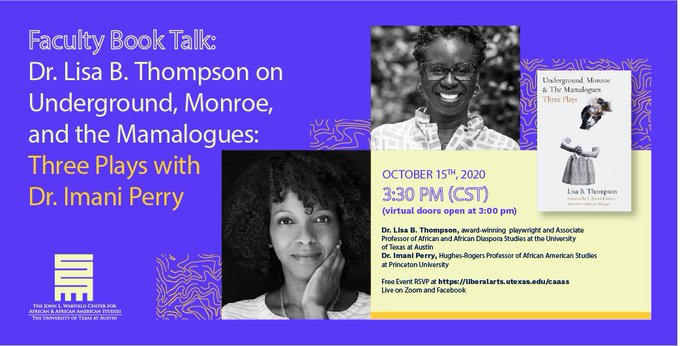[ https://abs.twimg.com/emoji/v2/... draggable="false" alt="🧵" title="Thread" aria-label="Emoji: Thread"> THREAD]
https://abs.twimg.com/emoji/v2/... draggable="false" alt="🧵" title="Thread" aria-label="Emoji: Thread"> THREAD]
Faculty Book Talk: "Monroe, Underground, and The Mamalogues: Three Plays"
@DrLisaBThompson & @imaniperry
October 15, 2020
Faculty Book Talk: "Monroe, Underground, and The Mamalogues: Three Plays"
@DrLisaBThompson & @imaniperry
October 15, 2020
These full introductions for @DrLisaBThompson and @imaniperry!!! Just in case anyone had any doubts that they are THE BLUEPRINT! I could never!
This real moment between Dr. Thompson and Dr. Perry asking each other how they are and them being honest about how they are feeling? Needed on this day.
Dr. Perry compliments Dr. Thompson on the elegance and richness of her plays, especially when issues of generational differences, class, migration, and gender come up in the material.
Dr. Thompson speaks on how heartbreaking it is to see differences and distaste between different generations on the internet within the Black community. She sees all people as her people, so the language of repudiation (i.e. "I am not my ancestors") is disheartening to her.
A SCOOP FOR Y& #39;ALL: Dr. Thompson is writing the two plays meant to be follow-ups to "Monroe." The third, "Flood" is set in the contemporary period, centering a "reverse migration" of a Black family that is inspired by her own family.  https://abs.twimg.com/emoji/v2/... draggable="false" alt="😮" title="Gesicht mit offenem Mund" aria-label="Emoji: Gesicht mit offenem Mund">
https://abs.twimg.com/emoji/v2/... draggable="false" alt="😮" title="Gesicht mit offenem Mund" aria-label="Emoji: Gesicht mit offenem Mund">
Did y& #39;all know Dr. Thompson wrote "Monroe" in a graduate class taught by Dr. Cherríe Moraga? Incredible!
Dr. Perry relates her own family migration history to Dr. Thompson& #39;s family migration history, as it inspires the characters in "Monroe."
Dr. Perry speaks on the poignancy of the characters of "Underground" in terms of their complexities and how they navigate their friendship within civil rights movements in California after the 1960s.
Dr. Thompson points out how the debates between the characters in "Underground" are not new. Very much like Booker T. Washington v. W.E.B. DuBois, Malcolm X v. Martin Luther King Jr., and Michelle Obama v. Angela Davis.
"Wherever we are politically [as Black people], we are still opening doors and fighting." --Dr. Imani Perry
Dr. Perry points out how there are regional differences that can be seen in Dr. Thompson& #39;s work. Regionality is weaved quite seamlessly in these three plays, yet they capture a Black experience that is shared and recognized regardless.
Dr. Thompson gets emotional when speaking about her characters, because many of them are inspired by her family members and friends. Many of them have passed away, so she brings them back within her plays, that& #39;s her spirit work.  https://abs.twimg.com/emoji/v2/... draggable="false" alt="😢" title="Weinendes Gesicht" aria-label="Emoji: Weinendes Gesicht">
https://abs.twimg.com/emoji/v2/... draggable="false" alt="😢" title="Weinendes Gesicht" aria-label="Emoji: Weinendes Gesicht">
This conversation& #39;s turn to grief and death in Black life that many times white life never has to experience? Incredibly poignant in this moment of the pandemic and other health and housing crises.
On the precarity of Black middle class for mothers raising children in "The Mamalogues," Dr. Thompson speaks on the importance of her own experience of raising her own son while writing plays and trying to get tenure shaping the play.
The expectations white women put on Black mothers? Ooof. The rage and madness of these kinds of violent experiences are at the core of Dr. Thompson& #39;s "The Mamalogues."
"The Mamalogues" is not just a lesson for white mothers, it& #39;s also a love letter to Black mothers of all socioeconomic classes, per Dr. Thompson. It& #39;s also a recognition for the constantly illegible Black middle class single mom that so many people "don& #39;t know what to do with."
Dr. Thompson points out she writes plays to make sense of the world as she lives it and is a compliment to her scholarly work, which is not as accessible to most people outside of the academy.
Dr. Perry compliments Dr. Thompson& #39;s ability to write characters that an audience member can know their age without it being specified. It takes a lot of experience & study in order to do this successfully. Dr. Thompson says she just wanted to see her grandmother speak on stage.
One of Dr. Thompson& #39;s future plays involves the figures of scholar/artists in order to leave some crumbs for future scholar/artists that will hopefully make their work easier and more accessible to accomplish.
People: "How do you do it all, Lisa?"
Dr. Thompson: "Don& #39;t ask me how I do it all. Ask me how you can help."
Us:
Dr. Thompson: "Don& #39;t ask me how I do it all. Ask me how you can help."
Us:
Dr. Thompson laments that Black plays aren& #39;t included in those lists of "Must-Read Black Books." Usually see fiction, poetry, memoirs, & non-fiction included. Playwrights are incredibly important to Black creativity, so teach them, include them in lists, pick & #39;em up at the store!
Twitter started tweaking about 10 minutes before the wonderful chat between Dr. Perry and Dr. Thompson ended and we couldn& #39;t finish the live-tweet for you all. You can catch the replay on our Facebook page!
[END OF THREAD https://abs.twimg.com/emoji/v2/... draggable="false" alt="🧵" title="Thread" aria-label="Emoji: Thread">]
https://abs.twimg.com/emoji/v2/... draggable="false" alt="🧵" title="Thread" aria-label="Emoji: Thread">]
[END OF THREAD

 Read on Twitter
Read on Twitter THREAD]Faculty Book Talk: "Monroe, Underground, and The Mamalogues: Three Plays" @DrLisaBThompson & @imaniperry October 15, 2020" title="[https://abs.twimg.com/emoji/v2/... draggable="false" alt="🧵" title="Thread" aria-label="Emoji: Thread"> THREAD]Faculty Book Talk: "Monroe, Underground, and The Mamalogues: Three Plays" @DrLisaBThompson & @imaniperry October 15, 2020" class="img-responsive" style="max-width:100%;"/>
THREAD]Faculty Book Talk: "Monroe, Underground, and The Mamalogues: Three Plays" @DrLisaBThompson & @imaniperry October 15, 2020" title="[https://abs.twimg.com/emoji/v2/... draggable="false" alt="🧵" title="Thread" aria-label="Emoji: Thread"> THREAD]Faculty Book Talk: "Monroe, Underground, and The Mamalogues: Three Plays" @DrLisaBThompson & @imaniperry October 15, 2020" class="img-responsive" style="max-width:100%;"/>


